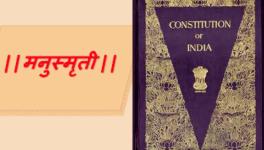Why Demolishing Homes of Muslims Also Undermines Their Citizenship
Bulldozers marched with the police force in Uttar Pradesh recently, demolishing the homes of Muslims in cities and towns. Journalists attended these like they were spectacles, with loud cheers. The mainstream media projected bulldozers as law-enforcing machines that deliver justice each time they ravage a home. Social media “warriors” justified the procession of violence against India’s most significant minority community as an essential act of due process.
Ever since it came to power in the 2017 Assembly election, the Yogi Adityanath regime has turned Uttar Pradesh into a laboratory where the social denigration of Muslims is par for the course. Bulldozing Welfare Party chief and businessman Javed Mohammad’s house in Allahabad was just the latest instance in this violent streak. The official justification was that student-activist Afreen Fatima’s father was the “mastermind” of the Friday protests of 10 June, which took a violent turn.
Indeed, the spate of demolitions makes it clear that Indian democracy is not in good shape. But their loudest message is from the State, that it is the only legitimate wielder of physical violence. It enjoys a monopoly over violence and physical coercion and can use these at will to establish order and the rule of law. The elected or ruling regime exercises its powers on behalf of the State.
What is forgotten is that the Constitution holds governments accountable, too, and bars them from arbitrarily exercising their power, including the Bharatiya Janata Party (BJP)’s communal-majoritarian influence. Under BJP rule, everyday violence against Muslims has risen to unprecedented degrees as the State asserts its monopoly over coercion. The lumpen Hindutva gangs that publicly assault and lynch the poorest Muslims are emissaries of this State power. The repressive apparatus targets the religious identity of minorities and institutionalises violence against them.
At the second level, smashing homes marks the acceleration of the Hindu Rashtra project. It will further change the character of State agencies. Political philosopher Hannah Arendt said anti-Semitism climaxed once the Jews had lost their public influence; when even their wealth served no visible function in society. In contemporary India, Muslims are made powerless and isolated from the democratic collective. This makes the series of demolitions a collective punishment of the community, but there is more. Breaking down homes makes it clear that the Muslims are not to succeed in economic terms either. It is of a piece with the attacks on the livelihood of Muslim vegetable vendors and hawkers during the Covid-19 lockdowns. Added to this, property damage propels a family and community towards socio-economic decline. This is the very definition of a targeted attack, which hurts both social and economic life.
Politics behind demolitions
Javed’s home was bulldozed in broad daylight while the Hindutva regime rejoiced. Home is not just a building but a repository of memory and an intimate space of belonging and care, the foundations of the family. Our desires, dreams and hope define home, a sociopolitical location.
Remember, all identity regimes locate citizens through their permanent address. Recall the protests against the Citizenship Amendment Act (CAA), 2019, in which Indians poured out on the streets asserting that India is their home. Implicit in this is the recognition of State power to declare who is a citizen or belongs to any of its states, cities, villages, or address within these. The State engraves our residential address on identity cards that it authorises. In other words, even in the eyes of the State, a home is not just a place to shelter or store belongings. The State is fully aware that its demolition drives targeting the Muslims are more than a loss of property. It is an abrupt erosion of their identity and history.
Who are you without a home? How will you locate yourself in this land of billions without a place to live? Homelessness induced by the Hindutva regime is a version of loss of citizenship. That is why, for them, it is necessary to project Muslims as perpetrators of communal tension, only after which can they be charged and jailed. This paves the way for stringent laws like the Unlawful Activities Prevention Act (UAPA), 1967, or the National Security Act (NSA), 1980, etc., to be applied to them. Serious charges under these laws do not just rob individuals of personal freedom. They can deny entire communities of dignity and humiliate them.
Contentious terrain of legality
Home demolition, or “bulldozer justice”, has BJP-ruled Uttar Pradesh at its epicentre, from where it is flowing to other states where the party is in power. Legal experts say such demolitions are illegal and discriminatory. Indeed, no rulebook can explain or justify the targeted violence against any community. According to the eminent Marxist thinker, late Aijaz Ahmad, such situations imply a takeover of the State from within. The BJP has tried to create a consensus on its actions through the mass media and hate campaigns, which ultimately aim to generate legitimacy for retributive violence. It operates outside the domain of a liberal constitutional order, in which only the judiciary can pronounce someone guilty. The silence of courts as the regime perpetrates violence against the Muslims will only have the government claim more impunity.
Post-secular India
Every passing day makes violence against Muslims more banal as secularism in India decays. Post-secular India is turning the Muslims into passive subjects with no active agency related to citizenship. It primarily warns activists who criticise the regime from the secular perspective. Arrests in the Delhi riots cases amply demonstrated that protests claiming citizenship rights would attract the wrath of the State, and the pattern seems no different with respect to cases arising today.
It is important to note that socially, economically and politically sidelined Muslim communities challenge secular coexistence. After all, exclusion marks the Hindutva theory of nation, alien to Indian civilisation (and not the other way around). Extreme repression fosters the possibility of mass movements based on secular principles. That is why Hindutva politics is constantly getting challenged—at Shaheen Bagh, ‘Not in My Name’, anti-privatisation protests, or those against the new hiring policy for the military.
This is because Hindutva does not just have disdain for Muslims or minorities but disregards the disadvantaged and weak in every sphere. Any project against economic, political or social disenfranchisement needs a broad coalition of mass movements to come together. Only when that happens can India’s Muslim citizens also triumph over divisive Hindutva.
The author is a researcher. The views are personal.
Get the latest reports & analysis with people's perspective on Protests, movements & deep analytical videos, discussions of the current affairs in your Telegram app. Subscribe to NewsClick's Telegram channel & get Real-Time updates on stories, as they get published on our website.























